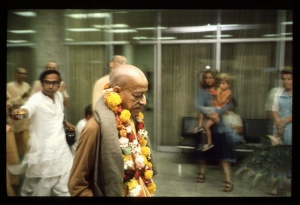CC Madhya 2.42: Difference between revisions
m (1 revision(s)) |
No edit summary |
||
| Line 1: | Line 1: | ||
{{ | [[Category:Sri Caitanya-caritamrta - Madhya-lila Chapter 02|C042]] | ||
<div style="float:left">'''[[Sri Caitanya-caritamrta|Śrī Caitanya-caritāmṛta]] - [[CC Madhya|Madhya-līlā]] - [[CC Madhya 2|Chapter 2: The Ecstatic Manifestations of Lord Śrī Caitanya Mahāprabhu]]'''</div> | |||
<div style="float:right">[[File:Go-previous.png|link=CC Madhya 2.41|Madhya-līlā 2.41]] '''[[CC Madhya 2.41|Madhya-līlā 2.41]] - [[CC Madhya 2.43|Madhya-līlā 2.43]]''' [[File:Go-next.png|link=CC Madhya 2.43|Madhya-līlā 2.43]]</div> | |||
{{CompareVersions|CC|Madhya 2.42|CC 1975|CC 1996}} | |||
{{RandomImage}} | |||
==== TEXT 42 ==== | ==== TEXT 42 ==== | ||
<div | <div class="verse"> | ||
ka-i-avarahi-aṁ pemmaṁ ṇa hi hoi māṇuse loe | :ka-i-avarahi-aṁ pemmaṁ ṇa hi hoi māṇuse loe | ||
ja-i hoi kassa virahe hontammi ko jīa-i | :ja-i hoi kassa virahe hontammi ko jīa-i | ||
</div> | </div> | ||
| Line 12: | Line 16: | ||
==== SYNONYMS ==== | ==== SYNONYMS ==== | ||
<div | <div class="synonyms"> | ||
ka-i-avarahi-am—without any cheating propensity, without any motive concerning the four principles of material existence (namely, religiosity, economic development, sense gratification and liberation); | ''ka-i-avarahi''-am—without any cheating propensity, without any motive concerning the four principles of material existence (namely, religiosity, economic development, sense gratification and liberation); ''pemmam''—love of Godhead; ''ṇa''—never; ''hi''—certainly; ''hoi''—becomes; ''māṇuse''—in human society; ''loe''—in this world; ''ja-i''—if; ''hoi''—there is; ''kassa''—whose; ''virahe''—in separation; ''hontammi''—is; ''ko''—who; ''jīa-i''—lives. | ||
</div> | </div> | ||
| Line 19: | Line 23: | ||
==== TRANSLATION ==== | ==== TRANSLATION ==== | ||
<div | <div class="translation"> | ||
“‘Love of Godhead, devoid of cheating propensities, is not possible within this material world. If there is such a love, there cannot be separation, for if there is separation, how can one live?’ | “‘Love of Godhead, devoid of cheating propensities, is not possible within this material world. If there is such a love, there cannot be separation, for if there is separation, how can one live?’ | ||
</div> | </div> | ||
| Line 26: | Line 30: | ||
==== PURPORT ==== | ==== PURPORT ==== | ||
<div | <div class="purport"> | ||
This is a verse in a common language called prākṛta, and the exact Sanskrit transformation is kaitava-rahitaṁ premā na hi bhavati mānuṣe loke/ yadi bhavati kasya viraho virahe saty api ko jīvati. | This is a verse in a common language called ''prākṛta'', and the exact Sanskrit transformation is ''kaitava-rahitaṁ premā na hi bhavati mānuṣe loke''/ ''yadi bhavati kasya viraho virahe saty api ko jīvati''. | ||
</div> | </div> | ||
__NOTOC__ | |||
<div style="float:right; clear:both;">[[File:Go-previous.png|link=CC Madhya 2.41|Madhya-līlā 2.41]] '''[[CC Madhya 2.41|Madhya-līlā 2.41]] - [[CC Madhya 2.43|Madhya-līlā 2.43]]''' [[File:Go-next.png|link=CC Madhya 2.43|Madhya-līlā 2.43]]</div> | |||
__NOTOC__ | |||
__NOEDITSECTION__ | |||
Revision as of 05:35, 24 July 2021

A.C. Bhaktivedanta Swami Prabhupada
TEXT 42
- ka-i-avarahi-aṁ pemmaṁ ṇa hi hoi māṇuse loe
- ja-i hoi kassa virahe hontammi ko jīa-i
SYNONYMS
ka-i-avarahi-am—without any cheating propensity, without any motive concerning the four principles of material existence (namely, religiosity, economic development, sense gratification and liberation); pemmam—love of Godhead; ṇa—never; hi—certainly; hoi—becomes; māṇuse—in human society; loe—in this world; ja-i—if; hoi—there is; kassa—whose; virahe—in separation; hontammi—is; ko—who; jīa-i—lives.
TRANSLATION
“‘Love of Godhead, devoid of cheating propensities, is not possible within this material world. If there is such a love, there cannot be separation, for if there is separation, how can one live?’
PURPORT
This is a verse in a common language called prākṛta, and the exact Sanskrit transformation is kaitava-rahitaṁ premā na hi bhavati mānuṣe loke/ yadi bhavati kasya viraho virahe saty api ko jīvati.